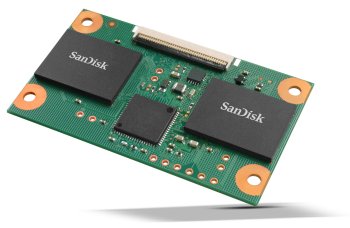SanDisk Corporation today announced that it has begun shipping its next-generation flash memory-based solid state drives (SSD) for netbooks, offering high-performance components at a competitive price. SanDisk® pSSD™ P2 and S2 employ a new technology called nCache™, which improves netbook performance. The drives will be demonstrated at the SanDisk booth at Computex, Taipei, June 2-6, 2009: Booth # N709 Nangang Hall, 4th floor.

Netbooks are small, low-cost computers that offer consumers a highly portable means of surfing the Internet, accessing email as well as enjoying their favorite music and videos on the go. Market researchers, IDC, project consumer purchases of netbooks to rise from 11.5 million sold in 2008 to 50 million in 2013.
nCache: Advanced Technology for Faster Performance
SanDisk’s exclusive nCache technology is a non-volatile write cache capable of supporting burst performance up to five times the steady state vRPM to further enhance the user experience. nCache improves user responsiveness and helps prevent incidence of “stalling” or “shuddering” often seen in first generation netbook SSDs.
The SanDisk pSSD P2 and S2 drives offer 9,000 vRPM of steady state performance in addition to nCache, which goes beyond this and offers a non-volatile cache of up to 320MB* to support bursts of random write commands maximizing system responsiveness. In addition, because nCache is non-volatile, the user’s data is protected in the event of a power interruption.
“Full-featured operating systems make tremendous demands in the storage device – writing large amounts of data in fast bursts using small random transfer sizes,” said Doreet Oren, director, product marketing, SanDisk. “SanDisk pSSD drives with nCache offer up to 50 times the random write performance of our first generation SSDs, delivering on the SSD promise for netbooks.”
Availability
Available in capacities of 8, 16, 32 and 64-gigabytes (GB), SanDisk second-generation pSSD drives are attractively priced for segments such as Netbooks, POS terminals, printers, ATMs and other applications where users need HDD functionality with improved reliability, yet want to pay only for the exact capacity that they need.

